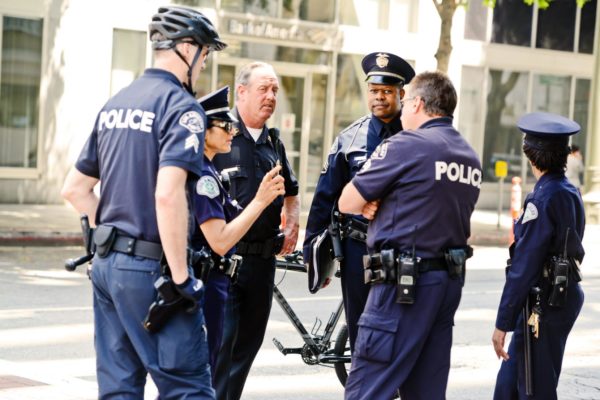The public may be demanding softer policing policies, but are officers who embrace such policies actually conducting themselves in ways the public hopes and expects? No, they are not. And there is cost to us all.
When a police officer shoots an unarmed black man, a tragic, all-too-familiar cycle of events ensues: Communities seethe in anger, knee-jerk accusations are hurled from all sides, and boiler-plate defenses are frantically mounted.
In response, police chiefs and city leaders promise swift action and imminent change: a greater shift to community-oriented policing — a kinder, gentler philosophy that emphasizes community outreach, citizens’ voice, and the much bandied “collaborative problem solving.”
As an organizational psychologist, what I found was startling when I studied six U.S. police agencies, collecting 794 body camera footage videos of 164 officers.
When cops believe they are misunderstood and underappreciated, gentler policing philosophies do not increase officer effectiveness. In fact, amid public strife, more empathetic police officers are less effective at ensuring the basic safety of citizens. They make more procedural errors, the kind of missteps that can be deadly.
By contrast, officers who endorse a more conservative, law-and-order approach are more effective at executing basic duties properly and safely.
And herein lies a slice of the problem. In response to police-public tension, policy leaders looking to make positive change reject “traditional” law enforcement strategies in favor of initiatives such as community policing, even when such strategies’ effectiveness is questionable, resulting in the same officer blunders that infuriated the public in the first place.
Massive government funds are deployed to fulfill the promises of kinder policing. Since 1994, the Office of Community Oriented Policing Services (COPS) has committed over $14 billion of federal funds. The result? Another officer shooting followed by anger, accusations, defenses and promises.
The Trump administration is proposing a 50 percent cut to the COPS program in the 2019 budget. But that is not be the approach. Rather than reducing funding, the underlying objectives and strategies of COPS need to change. Funds should be redirected to develop and test standard operating procedures that help officers make more effective decisions under pressure.
It all boils down to expectations. Community policing philosophies lead officers to expect the public to reciprocate with understanding and appreciation. But, in many minority communities — the same ones in which public leaders typically rush to implement community policing — such responses are not always the reality.
Officers are led to expect things that are never fulfilled. Unmet expectations can confuse and frustrate officers, hurting their ability to carry out basic duties. Under these circumstances, they end up hesitating more, being less cautious, and making more mistakes on the job than if they simply followed a straightforward, by-the-book approach to policing.
To prevent such outcomes, funding should be redirected to helping agencies fine-tune, develop and rigorously test standardized protocols to deal with the realities police officers face. We desperately need more insights into how the human mind works when faced with relentless criticism and a lack of appreciation.
Behavioral researchers have time and again shown that during stressful times, routines and habits can increase the reliability of decisions. People are less anxious and better able to “tune out” distractions.
By redirecting funding to developing protocols that are proven to work in real-life situations, COPS can truly live up to its mandate. It is not just a matter of taxpayer money better spent. It is, foremost, a matter of protecting human life.
Shefali V. Patil is an assistant professor of management in the McCombs School of Business at The University of Texas at Austin.
A version of this op-ed appeared in the Abilene Reporter News, Dallas Morning News and the San Antonio Express News.
To view more op-eds from Texas Perspectives, click here.
Like us on Facebook.




